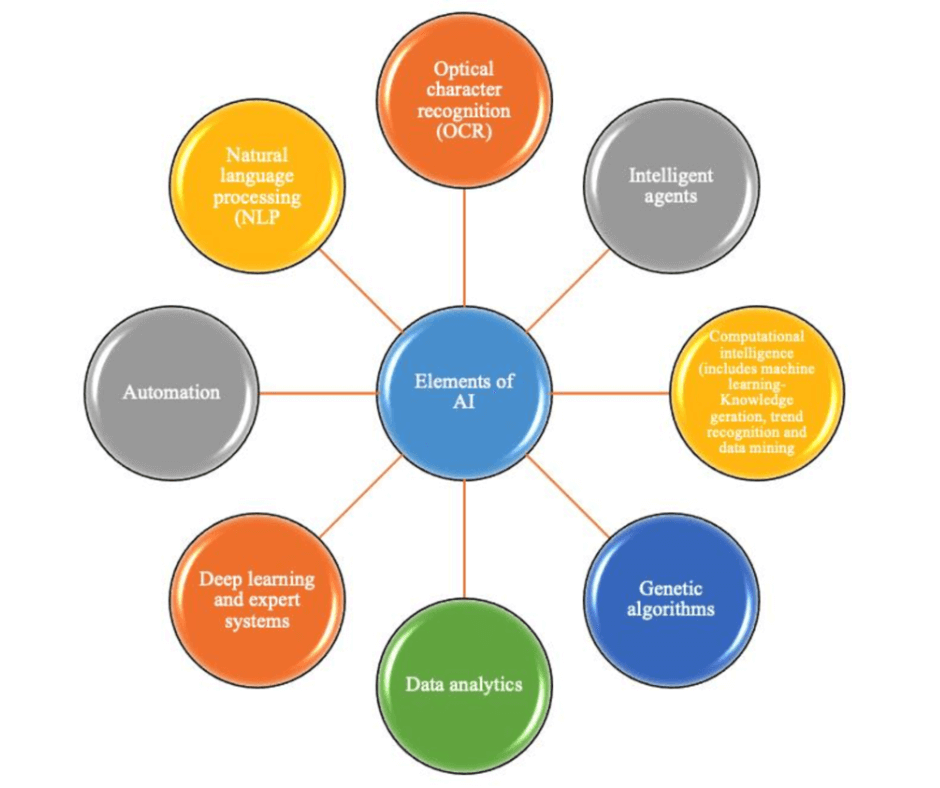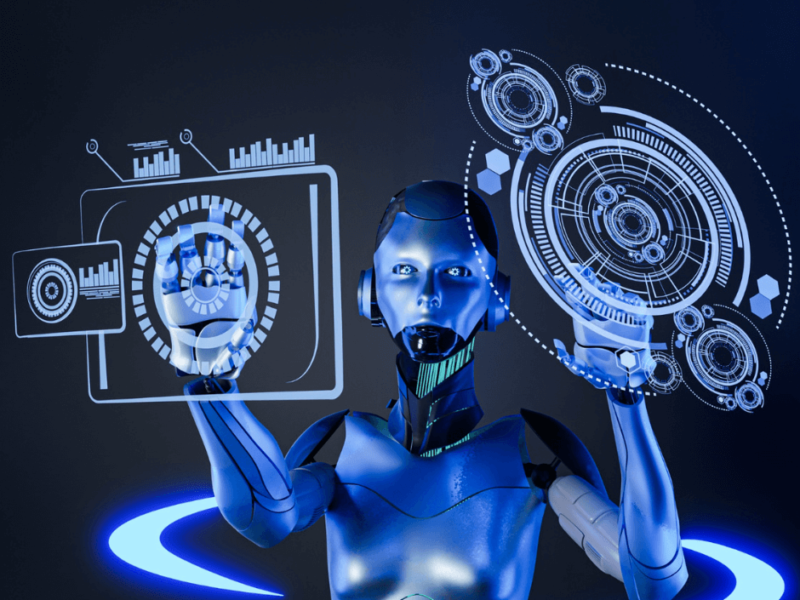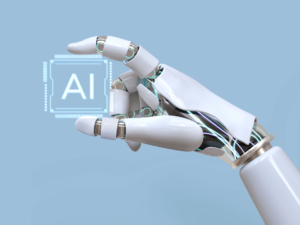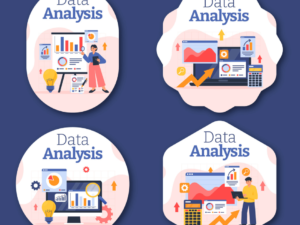As businesses strive to stay competitive in 2025, AI tools and automation are proving to be key drivers of innovation. With the ability to automate repetitive tasks, provide real-time data insights, and improve decision-making processes, AI is reshaping industries across the globe.
This article explores the top AI tools, how they can enhance business operations, and why automation is critical for the future.
Image: AI tools transforming business efficiency.

Table of Contents
Understanding AI Tools & Automation
AI tools and automation refer to technologies that use artificial intelligence to automate processes, analyze data, and assist with decision-making.
By reducing the need for manual intervention, these tools allow businesses to operate more efficiently and cost-effectively. Automation handles everything from routine tasks to complex workflows, freeing up time for teams to focus on high-level strategy.
AI tools are rapidly advancing, thanks to machine learning, deep learning, and natural language processing (NLP). These advancements have enabled businesses to scale their operations without increasing headcount, while still delivering personalized customer experiences.
Watch the Video:
How AI Tools are Changing Business Operations
Video: A detailed overview of AI tools and their impact on business automation.
The Benefits of AI Tools for Workflow Optimization
Workflow optimization through AI tools allows businesses to automate processes like task management, data entry, and communication, reducing manual errors and boosting efficiency. Businesses leveraging these tools are better positioned to scale and meet customer demands.
One key tool for workflow optimization is Monday.com, which provides an AI-powered project management platform. It enables teams to track tasks, manage projects, and automate repetitive processes with ease.
Monday.com Features:
- AI-driven task automation.
- Customizable workflows.
- Real-time progress tracking across projects.
Learn More About Monday.com: Explore Monday.com
Anchor Text: Discover how Monday.com automates workflows with AI.
Another powerful tool for cross-application automation is Zapier, which connects over 3,000 apps and automates workflows across platforms. Zapier allows businesses to automate complex tasks without any coding, making it accessible for teams of all sizes.
Zapier Features:
- Seamless app integration.
- Easy-to-use workflow builder.
- Automates multi-step processes across platforms.
Visit Zapier for Workflow Automation: Learn More About Zapier
Anchor Text: Explore how Zapier connects apps and automates workflows.
Image: Example of AI tools automating complex workflows.
Enhancing Marketing with AI Tools & Automation
In marketing, AI tools and automation have become indispensable for managing campaigns, personalizing customer interactions, and optimizing ROI. Marketers can now automate everything from email marketing to social media management, giving them more time to focus on creative strategy.
HubSpot is one of the leading AI marketing platforms, offering tools that automate lead nurturing, content management, and personalized email campaigns. HubSpot’s AI-powered platform analyzes customer behavior to provide real-time recommendations that improve campaign performance.
HubSpot Features:
- AI-driven email automation.
- Customer segmentation based on behavior.
- Detailed campaign analytics and reporting.
Explore HubSpot AI: Discover HubSpot
Anchor Text: Learn how HubSpot’s AI tools help automate marketing campaigns.
For social media, Hootsuite is an AI-powered tool that allows businesses to schedule posts, track engagement, and analyze social performance across multiple platforms. Hootsuite automates social media management, saving marketers valuable time while ensuring consistent content delivery.
Hootsuite Features:
- AI-driven social media scheduling.
- Content recommendations based on trends.
- Real-time performance tracking and analytics.
Learn More About Hootsuite: Visit Hootsuite
Anchor Text: Automate your social media strategy with Hootsuite’s AI tools.

Revolutionizing Customer Service with AI Tools & Automation
Customer service is one of the areas where AI tools have had the most profound impact. AI chatbots and virtual assistants are being used to provide instant responses to customer queries, manage ticketing systems, and even handle complex interactions, all without human intervention.
Freshdesk is a popular AI-powered customer support platform that uses Freddy AI to automate ticketing, provide real-time responses, and manage workflows. By integrating AI, businesses can handle large volumes of customer inquiries while maintaining a high level of service.
Freshdesk Features:
- AI-driven ticketing automation.
- Instant responses to frequently asked questions.
- Predictive analytics for customer satisfaction.
Explore Freshdesk AI: Visit Freshdesk
Anchor Text: Discover how Freshdesk automates customer service with AI.
Drift is another powerful tool for conversational AI, helping businesses automate real-time chat interactions with customers. Drift’s AI assistant qualifies leads, provides personalized responses, and seamlessly integrates with CRM systems to create a streamlined customer journey.
Drift Features:
- Real-time conversational AI for chat.
- AI-powered lead qualification.
- Integration with major CRM platforms.
Discover Drift for AI Customer Service: Learn More About Drift
Anchor Text: See how Drift automates customer interactions with AI chatbots.
Image: Drift’s AI handling real-time customer service inquiries.
Using AI Tools & Automation for Data Analysis
The ability to analyze vast amounts of data is one of the greatest strengths of AI tools. Businesses can use AI to process complex datasets, forecast trends, and make informed decisions that drive growth. AI-powered data analytics tools allow businesses to gain deeper insights and turn data into actionable strategies.
Tableau is a leading platform that offers AI-powered data visualization tools, making it easy for businesses to analyze large datasets and present them in an intuitive, easy-to-understand format.
Tableau Features:
- AI-enhanced data analytics.
- Customizable dashboards for visual data insights.
- Predictive analytics for trend forecasting.
Explore Tableau for AI Data Analytics: Discover Tableau
Anchor Text: Learn how Tableau turns complex data into actionable insights with AI.
Another standout tool is IBM Watson Analytics, which uses machine learning to process vast datasets, identify patterns, and deliver predictive insights. It helps businesses make better decisions by providing accurate forecasts and data-driven recommendations.
IBM Watson Features:
- Machine learning for predictive analysis.
- AI-powered data processing and insights.
- Scalable solutions for large enterprises.
Visit IBM Watson for Predictive Analytics: Learn More About IBM Watson
Anchor Text: Discover how IBM Watson enhances business decisions with AI-driven analytics.
Image: Tableau’s AI-driven data analytics platform in action.
AI Writing Tools: Enhancing Automation
AI writing tools are changing content creation. They help writers, marketers, and creators produce engaging content quickly. These tools use advanced algorithms to help with writing. They generate ideas, draft articles, and refine grammar and style.
Functionality and Benefits of AI Writing Tools:
- Content Generation: AI writing tools can quickly create drafts from input keywords. They help overcome writer’s block and speed up content creation. These tools use NLP to ensure the text is coherent and appropriate.
- Editing and Proofreading: AI tools do more than spell-check. They offer advanced grammar and style fixes. They suggest ways to improve clarity, tone, and readability. They help polish the final product. They also teach writers better writing practices.
- SEO Optimization: Many AI writing tools can optimize content for search engines. They suggest relevant keywords and analyze a piece’s SEO potential. This integration makes the content both appealing and good for search.
Industry Applications:
- Marketing: In digital marketing, AI writing tools are vital. They create compelling copy that captures and engages the audience.
- Publishing: These tools help publishers produce a lot of content quickly. They ensure a consistent voice and quality across articles.
- Academic: AI tools help researchers and academics. They can structure papers, check for plagiarism, and ensure accurate citations.
Visual Element: A chart showing the time saved on various writing tasks. It compares AI tools to traditional writing methods.
Affiliate Links:
- Explore innovative AI writing tools on Amazon.
- Get robust hosting for your content management system at Hostinger.
- Find affordable writing aids on AliExpress.
For more on AI’s impact on writing, visit the Content Marketing Institute.
AI writing tools aim to do more than automate content creation. They seek to improve content quality and make the creative process more dynamic. AI technology is advancing. These tools are now more sophisticated.
They offer solutions that greatly improve productivity and creativity in content industries. AI writing tools can modernize and improve your writing. They give you an edge when drafting a blog, scripting a video, or crafting a pitch.
Generative AI Tools: Revolutionizing Automation
Generative AI tools are at the forefront of innovation. They are transforming industries by automating the creation of visual content and text. These tools use advanced machine learning to create new content from existing data. They are invaluable for designers, writers, marketers, and developers.
Capabilities and Applications:
- Content Generation: Generative AI tools can create many digital assets. These include images, videos, music, and text. These capabilities are vital in marketing and entertainment. Fresh, engaging content is key to audience retention and engagement.
- Design and Prototyping: In design, generative AI helps create visuals and layouts. It speeds up prototyping. These tools can suggest design changes. They will align with brand guidelines and user preferences. This will save time and effort in the design phase.
- Personalization at Scale: Generative AI excels at personalizing content for users. It has become a common tool in eCommerce and digital marketing. AI can analyze user behavior and preferences. It can then generate personalized recommendations and tailor content. This will enhance the user experience and satisfaction.
An infographic shows generative AI tools’ uses in various sectors. It illustrates their impact on productivity and creativity.
SEO and User Engagement:
- These tools improve content quality. They also optimize it for search engines. Generative AI tools can improve visibility and drive traffic. They achieve this through the use of SEO-friendly practices in their content.
Affiliate Links:
- Discover the latest generative AI tools on Amazon.
- Enhance your web hosting for AI applications at Hostinger.
- Find affordable AI solutions on AliExpress.
For a deep dive into generative AI, visit AI Trends.
Generative AI tools significantly enhance content creation and customization. They provide businesses with ways to save time and resources. Their methods maintain high creativity and relevance.
As these technologies evolve, they will drive digital transformation. This will usher in a new era of automated creativity. It will redefine content creation.
Frequently Asked Questions (FAQ)
What are AI tools and automation?
AI tools refer to software solutions that leverage artificial intelligence to automate tasks, process data, and provide real-time insights. Automation allows these tools to perform tasks with minimal human intervention, improving efficiency and accuracy.
How can AI tools benefit businesses?
AI tools can automate routine tasks, reduce operational costs, provide data-driven insights, and improve customer service. By eliminating manual labor, AI allows businesses to focus on strategic decision-making and high-value work.
Are AI tools only for large businesses?
No, many AI tools are designed to be scalable, making them accessible to small and medium-sized businesses. Platforms like Zapier and HubSpot offer affordable, customizable solutions that can grow alongside a business.
Can AI tools replace human workers?
While AI tools can automate many repetitive tasks, they are more likely to complement human work than replace it entirely. AI handles mundane tasks, freeing up employees to focus on creative, strategic, and complex work that requires human intelligence.
How do I choose the right AI tool for my business?
Start by identifying the specific needs of your business. Consider the tool’s integration capabilities, ease of use, scalability, and cost. Look for a solution that addresses your current challenges while offering room for growth as your business evolves.

Conclusion: The Future of AI Tools & Automation
As we move into 2025 and beyond, AI tools and automation will continue to play a critical role in shaping the future of business. Whether it’s automating workflows, enhancing marketing campaigns, improving customer service, or analyzing data, AI is unlocking new possibilities for growth.
Businesses that embrace AI and automation now will be better equipped to thrive in an increasingly digital world.
References:
- HubSpot AI Marketing: Visit HubSpot
- Freshdesk AI for Customer Service: Explore Freshdesk
- IBM Watson Analytics: Discover IBM Watson
Images:
- AI Tools & Automation Overview: Image Source
- AI Workflow Automation: Image Source
- AI Customer Service Automation: Image Source
- AI Data Analytics: Image Source
Videos:
- How AI Tools Are Changing Business Operations: Watch Video




